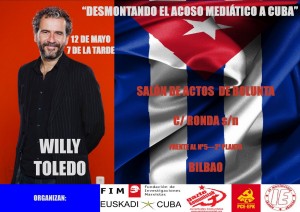
Willy Toledo – you either love him or you hate him. He made his big break as an actor on the TV show 7 Vidas alongside Paz Vega and Toni Cantó, but he is better known for his political activism.
Guillermo Toledo Monsalve, now 42, had an unusual upbringing. Christened by a left-wing priest in the final years of the Franco regime, Toledo’s father came from a working class family who managed to finance his degree in medicine and his mother is from an upper-class family. Despite his relatively privileged background, Toledo received an unorthodox education, studying at the Colegio Estilo, a school based on the principle of constant creative stimulation, which was popular with the members of the Communist Party and other leftist groups. He was immersed in politics from early childhood and as a teenager was already taking part in political demonstrations.
But he also became interested in movies and theatre and in 1994 he appeared in his first major film, with Jorge Sanz and María Barranco, Morirás en Chafarinas. He has since established himself as an acclaimed actor and he’s a founding member of the Animalario theatre group.
But he has never strayed far from politics. In 2000, the media started to take notice of his participation in street protests, specifically against the immigration law of former president José María Aznar. Much like American actor and activist Sean Penn, this role of rebel actor angered many and won the support of others. His outspokenness makes Toledo one of the most divisive public figure in Spain. Just search #WillyToledo on Twitter and you’ll see plenty of passionate comments both for and against him.
Recently he has hit the headlines again – and with his acting career taking a backseat lately, it’s his activism that has caught people’s attention. He was a trending topic on Twitter on March 29, 2012, the day of Spain’s general strike, due to his arrest for harassment of a bar owner and his customers in Madrid. Two days after being released he took time out to discuss his career and his political activism, insisting that the arrest was a misunderstanding.
Discussing his book Razones para la rebeldía (or ‘Reasons for rebellion’), which summarises his political views, Toledo says his ideas have changed from when he was younger, when he believed that simply being a rebel was enough. Now he thinks that it’s more necessary than ever to become a revolutionary, “What we need now is a revolution,” he says.
In 2011 Toledo participated in the 15M protests in Madrid, even addressing those gathered in Puerta del Sol square through a megaphone at the height of the demonstrations. He was criticised for getting involved, and despite his own misgivings he is clear about the movement’s importance: “I think it was a small wake-up call for society, but things weren’t that clear. Sometimes I had the feeling they weren’t waging a struggle against capitalism but were just asking for their piece of the capitalist pie.”
Spain’s political class were the main target of the 15M/indignados protests, but although the image of Spanish politicians is at an all-time low, Toledo still believes that some on the left are working for a better country, whereas the current and previous governments merely work for capitalism: “They are trying to sell us the image that the U.S. is a role model to follow. They don’t even have universal health service over there.”
His activism stretches abroad and he backs the Sahrawi people in their conflict with Morocco, seeing the root of their problem in their natural resources, the small size of their territory and the ignorance of people in general about Western Sahara. As for the Palestinians, whom he also supports, he believes they can expect a better future now that they have more international support.
But closer to home, he still sees plenty to make him angry, such as the monarchy.
“Fortunately, the Spanish people are realizing more and more that the monarchy is incompatible with democracy,” he says. “I’m sure we will see a Third Republic. All I can say about the monarchy is that it makes Franco’s dictatorship legitimate. How is it possible that the king came to Spain without a peseta and now, according to Forbes, he is one of the richest men in the world?”
And with that, Toledo had to leave for the theatre, where he was performing in a Spanish version of Harold Pinter’s The Dumb Waiter.
The Spanish King isn’t anything like so rich as Fidel Castro, whom Forbes Magazine rated as third richest head of state in the world. How can it be, with the rest of the island in such abject poverty? Presumably, that is what his “revolution” is supposed to achieve?
Of course, I neglected to mention that Toledo’s Stalinist idol is also “incompatible with democracy.” I suggest that there is more democracy under the constitutional monarchy in Spain than under the absolute, totalitarian dictatorship in Cuba. Indeed, there was more in Pinochet’s Chile! It should be noted that, brutal though those these authoritarian thugs were, Castro has murdered and disappeared more of his own people than all of them combined. And during his time at La Cabaña Fortress, Ernesto, the Rosario psychopath, Guevara personally shot many times as many innocent people as has Anders Breivik. I expect that, depraved though it seems to the human population, both have their “groupies.”